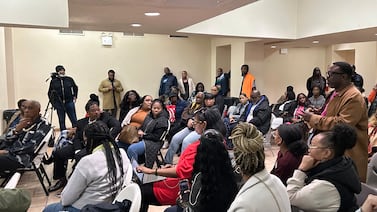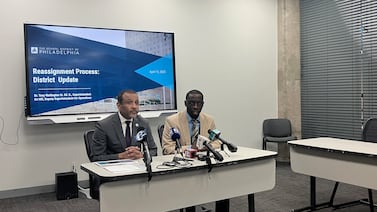Sign up for Chalkbeat Colorado’s free daily newsletter to get the latest reporting from us, plus curated news from other Colorado outlets, delivered to your inbox.
Every January, 100 men and women elected to the Colorado General Assembly gather in Denver for 120 days and make decisions that affect students and teachers in the classroom, university administrators trying to balance their budgets, and parents and students having to make tuition payments.
Legislators only have to pass two bills before they adjourn in May: a balanced budget and the school finance act. Both have profound implications for educational opportunity.
They also tackle many more education issues, from student discipline to teacher shortages, from standardized tests to college readiness.
But it can be hard for ordinary citizens to understand how ideas turn into laws.
To explain the lawmaking process and the opportunities for public input, we’ve prepared this guide to the legislative session.
How a bill becomes a law
Think Schoolhouse Rock’s “I’m Just a Bill.”
Legislators get ideas for bills from a lot of places. A legislator might have a passion for a particular topic. The governor’s office or state department leaders might request a policy change. An interest group or concerned parents might ask a lawmaker to help solve a problem.
Lawmakers work with bill drafters — nonpartisan legislative staff — to write a bill. Once a lawmaker introduces it, leaders in either the House or the Senate assign it to a committee, usually one with relevant expertise.
Most education bills go to the education committee, but a bill on youth mental health might land first in the health committee or one on police in schools might be heard by the judiciary committee.
A few committees — most infamously the State Affairs committees — are known as “kill” committees, where leadership can send controversial bills, especially those from the opposing parties, to ensure they don’t reach the floor.
A bill must win committee approval to proceed to the full House or Senate. Some bills might need to go through more than one committee.
Bills must get approved twice in the first chamber, before heading to the next chamber and doing it all over again. Bills can be amended at any point in the process, and both chambers must sign off on the same final form of a bill.
Then the governor must sign it into law.
Who has a vote on the Colorado education committees
The House Education Committee has 13 members, eight Democrats and five Republicans. Find the committee schedule, documents, and live and archived audio at the committee website. Members are:
- Chair Rep. Meghan Lukens, a Steamboat Springs Democrat
- Vice Chair Rep. Matthew Martinez, a Monte Vista Democrat
- Rep. Jennifer Bacon, a Denver Democrat
- Rep. Mary Bradfield, a Colorado Springs Republican
- Rep. Eliza Hamrick, a Centennial Democrat
- Rep. Anthony Hartsook, a Parker Republican
- Rep. Tammy Story, a Conifer Democrat
- Rep. Jarvis Caldwell, a Colorado Springs Republican
- Rep. Lindsay Gilchrist, a Denver Democrat
- Rep. Dusty Johnson, a Fort Morgan Republican
- Rep. Jacqueline Phillips, a Thornton Democrat
- Rep. Lori Garcia Sander, an Eaton Republican
- Rep. Lesley Smith, a Boulder Democrat
The Senate Education Committee has seven members, four Democrats and three Republicans. Find the committee schedule, documents, and live and archived audio at the committee website.
- Chair Sen. Chris Kolker, a Centennial Democrat
- Vice Chair Sen. Janice Marchman, a Loveland Democrat
- Sen. Paul Lundeen, a Monument Republican
- Sen. Janice Rich, a Grand Junction Republican
- Sen. Dafna Michaelson Jenet, a Commerce City Democrat
- Sen. Cathy Kipp, a Fort Collins Democrat
- Sen. Scott Bright, a Platteville Republican
Find the names and contact information of all current Colorado lawmakers here. And find maps of current legislative districts here.
Can you speak on a bill or submit testimony?
If you’re interested in having your perspective heard, there are a few ways to get involved.
You can speak on the bill in person or remotely, or submit a written statement to the committee. The sign-up process is not difficult. Just fill out this online form.
Speakers are generally limited to two to three minutes, so think about how to make your point quickly and clearly.
Want to know the schedule?
The full schedule of the House and Representatives can typically be found on the Colorado General Assembly’s landing page.
The session schedule should be posted daily and gets updated as bills move through the process.
Here’s how to look up Colorado General Assembly bills
You can go to the Colorado General Assembly’s bill search page. There you can search by a bill number, the sponsor, or a topic.
When you click on a bill, you’ll see information such as a summary of what the bill does, the full text of the bill, and other relevant information, such as a fiscal note that explains how much passing the law would cost the state. Often the description of a bill in the fiscal note is easier to understand than the bill language itself.
You can also search through tabs near the bottom of the page that include the bill’s history, when it’s scheduled to be heard again, any amendments, and a summary of the committee votes.
What’s the Joint Budget Committee, and why is it so important?
The six-member Joint Budget Committee is the most influential committee in the Colorado General Assembly. Why? Because it writes the budget that guides the state’s priorities. The committee members this year are four Democrats and two Republicans. The chair is state Sen. Jeff Bridges, an Arvada Democrat.
Yes, Gov. Jared Polis does submit a budget every November. And those priorities guide the Joint Budget Committee’s work. But the committee ultimately writes the budget that gets submitted to the Colorado General Assembly for approval.
Other lawmakers also have a chance to submit budget amendments that reflect their own spending priorities — but lawmakers need to pass a balanced budget and the Joint Budget Committee will strip out amendments that endanger that goal.
The budget shapes every facet of state government, including K-12 and higher education spending.
Learn more about the budget process here.
Read more
Need a refresher on what happened last year? We rounded up the most important education issues of the 2024 session.
Want to know more about how lobbying affects the legislative process? Check out our deep dive on education lobbying from 2022 in collaboration with data reporter Sandra Fish.
Have questions? We’re listening at co.tips@chalkbeat.org.
Watch Chalkbeat Colorado’s 2025 Legislative Preview
Watch Chalkbeat Colorado’s annual discussion of key education topics likely to surface during the upcoming legislative session.
We were joined by:
- Sen. Jeff Bridges, an Arvada Democrat and chair of the Joint Budget Committee.
- Sen. Barbara Kirkmeyer, a Weld County Republican who sits on the JBC.
- House Assistant Majority Leader Jennifer Bacon, a Denver Democrat.
- House Majority Co-Whip Matthew Martinez, a Monte Vista Democrat.
- Rep. Lori Garcia Sander, a Republican from Eaton who was elected in November.
A special thanks to our event sponsor, the Colorado Education Association. And thank you to our event partner, Young Invincibles.
Jason Gonzales is a reporter covering higher education and the Colorado legislature. Chalkbeat Colorado partners with Open Campus on higher education coverage. Contact Jason at jgonzales@chalkbeat.org.







